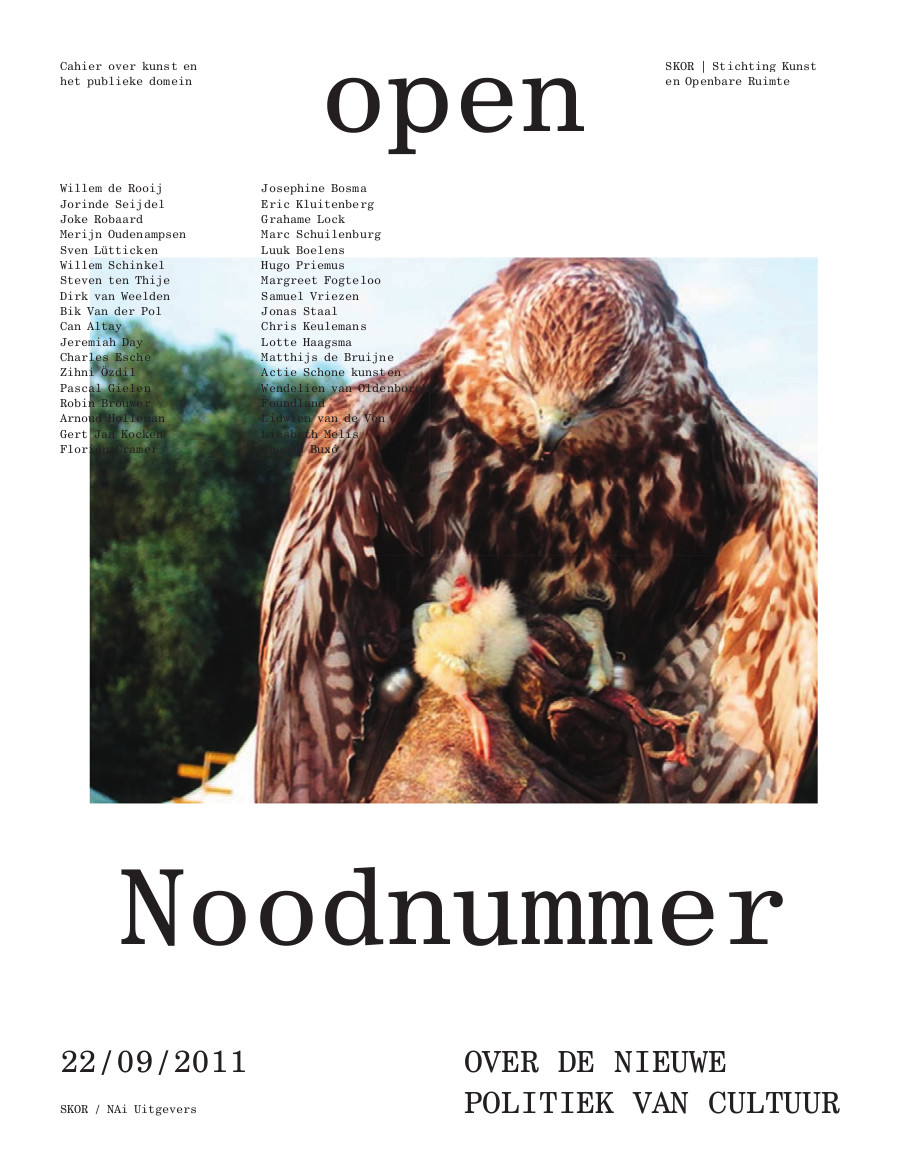OPEN Cahier on Art and the Public Domain: Emergency Issue. The New Politics of Culture (2011) [Dutch]
Filed under magazine | Tags: · art, creative industries, culture, education, environment, ideology, knowledge, multiculturalism, netherlands, politics

“The Dutch government’s new cultural plan and the cutbacks have intruded on our comfort zone and roughly awoken us from our reflective and theorising positions as critical observers.
This ’emergency issue’ of Open. Cahier on Art and the Public Domain is a special edition that accompanies De Groene Amsterdammer on September 23, 2011. It not only addresses the austerity measures, but also pays special attention to the overarching ideology and the right-populist government policy from which these arise.
Similarly, the publication does not merely defend the position of the arts, but is a record of public opposition to what many believe is a malicious policy that is adversely affecting or excluding growing numbers of groups (the sickly, immigrants, refugees, children, the elderly, artists, ‘ordinary’ people) and issues (relating to culture, knowledge, the environment, education, health care, multiculturalism).”
With contributions by Willem de Rooij, Jorinde Seijdel, Joke Robaard, Merijn Oudenampsen, Sven Lütticken, Willem Schinkel, Steven ten Thije, Dirk van Weelden, Bik Van der Pol, Can Altay, Jeremiah Day, Charles Esche, Zihni Özdil, Pascal Gielen, Robin Brouwer, Arnoud Holleman, Gert Jan Kocken, Florian Cramer, Josephine Bosma, Eric Kluitenberg, Grahame Lock, Marc Schuilenburg, Luuk Boelens, Hugo Priemus, Margreet Fogteloo, Samuel Vriezen, Jonas Staal, Chris Keulemans, Lotte Haagsma, Matthijs de Bruijne, Actie Schone kunsten, Wendelien van Oldenborgh, Foundland, Lidwien van de Ven, Liesbeth Melis, Thomas Buxó
Publisher: SKOR / NAi Uitgevers, September 2011
68 pages
PDF (updated on 2013-2-6)
Previous issues
Readings For Artworkers, No. 2: Creative Industries and Knowledge Factories: Analysis and Resistance (2010)
Filed under journal | Tags: · creative industries, education, knowledge, knowledge production

“Journal of the Free / Slow University of Warsaw provides a summary of another year of activity of our educational para-institution. In 2010 we continued our critical reflection on the transformation of the public sphere in Poland. We analysed the current changes in creative and cultural circulation, in the world of independent initiatives, official institutions of art, academies and universities. We organised: 12 open seminars from the cycle Readers for Artworkers hosted by sociologists, artists, curators and activists; Second Congress of the Free / Slow University of Warsaw – Creative Industries and Knowledge Factories: Analysis and Resistance participated by educators, artists, activists and cultural theorists from the entire Europe. The present report includes texts and transcriptions that summarise our seminars, the congress and debates organised by the FSUW in 2010.”
Journal of Free/Slow University of Warsaw, Poland, 2010
Culture, Not Profit series
FSUW curators: Kuba Szreder, Jan Sowa
Edited by: Arek Gruszczyński, Bogna Świątkowska, Joanna Turek, Szymon Żydek
Transcription: Joanna Turek, Zuzanna Stańska, Katarzyna Maniak
PDF (single PDF)
PDF (PDF articles)
Virtueel Platform: Sectoranalyse E-cultuur (2011) [Dutch]
Filed under report | Tags: · copyright, creative industries, cultural politics, digital art, digital culture, innovation, intellectual property, knowledge economy, mobile technology, netherlands, new media art, web 2.0

Nieuwe kunstsector een feit: 400 miljoen euro jaaromzet voor Nederlandse digitale kunst en cultuur.
De Nederlandse digitale kunstsector heeft een jaaromzet van 400 miljoen euro en geeft werk aan ruim 10.000 mensen. Dit blijkt uit de ‘Sectoranalyse E-cultuur’ van Virtueel Platform die maandag 18 juli 2011 uitkomt. Het onderzoek werd uitgevoerd door bureau Veldkamp / TNS NIPO.
De sectoranalyse laat voor het eerst de omvang en karakteristieken zien van de relatief jonge maar snelgroeiende e-cultuursector. Een innovatieve sector die bestaat uit medialabs, kunstenaars, gamebedrijven, festivals, presentatieplekken en media- en kunstopleidingen.
In het rapport zijn vijftien Best Practice, goede voorbeelden van e-cultuur, te vinden.
Trends
Uit het onderzoek blijkt verder dat organisaties sociale media (74%) de meest belangrijke ontwikkeling van het moment vinden, op de tweede plaats komt mobiele technologie (47%). Een struikelblok blijkt onduidelijkheid over auteursrecht, waar 37% van de ondervraagden graag betere oplossingen voor ziet. Websites, interactieve installaties, mobiele media en apps en games met een educatieve of culturele toepassing zijn belangrijke producten.
Innovatieve sector
Directeur Floor van Spaendonck: “Het is nu een feit: het onderzoek bevestigt met cijfers dat e-cultuur een eigen sector is binnen de kunst, met opleidingen, producenten en afnemers. In deze sector vinden unieke experimenten met kunst en nieuwe media plaats. Daarom is het zaak dat de overheid met een stevig e-cultuurprogramma deze ontwikkeling en onderzoek blijft stimuleren. Het werk van medialabs als Mediamatic, Waag, V2_ en andere pioniers draagt wezenlijk bij aan inhoudelijke reflectie en verdieping van de kennismaatschappij”.
Publisher: Virtueel Platform, Amsterdam, July 2011
36 pages
Published under Creative Commons BY-NC
PDF (no OCR)
Comment (0)
